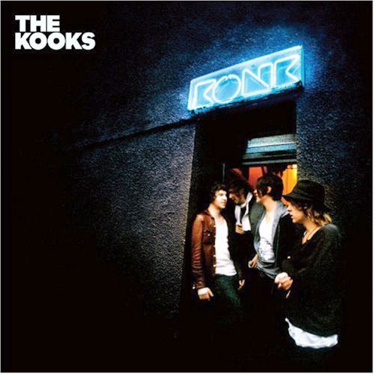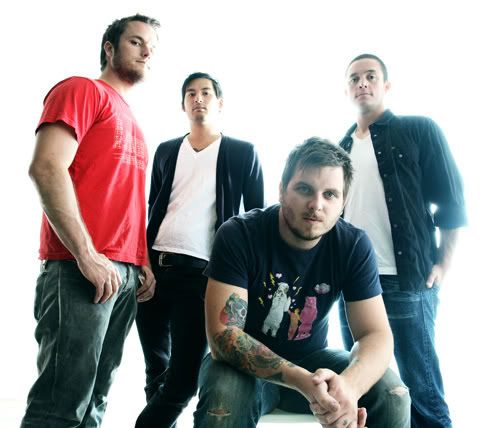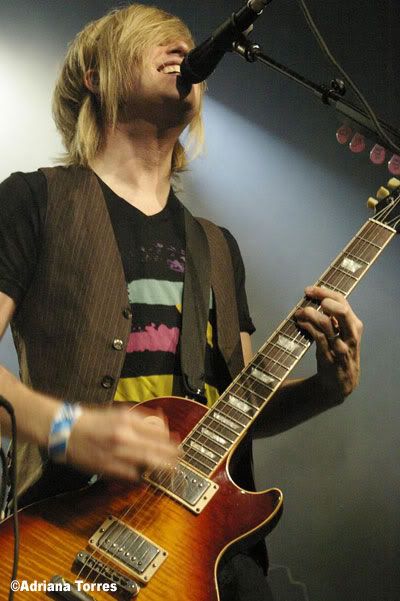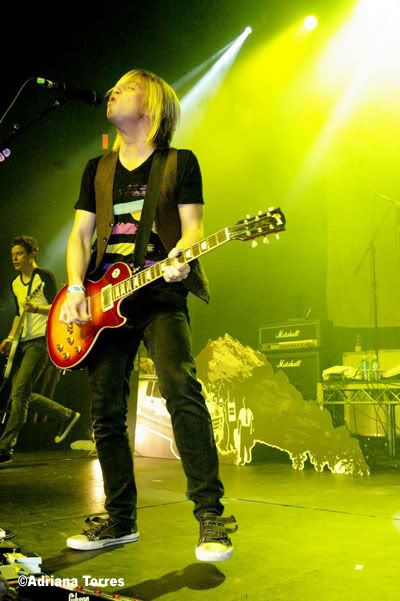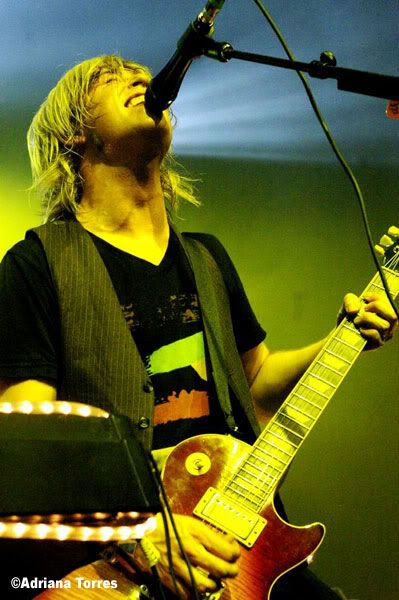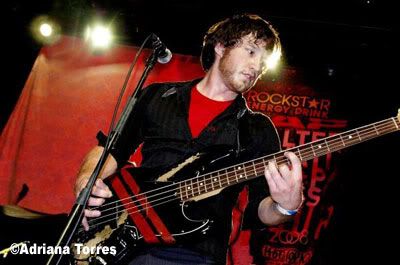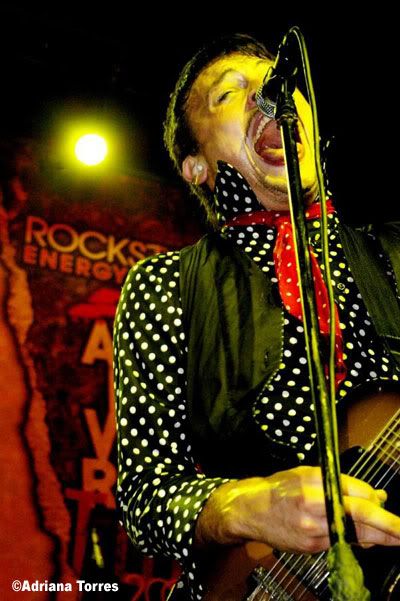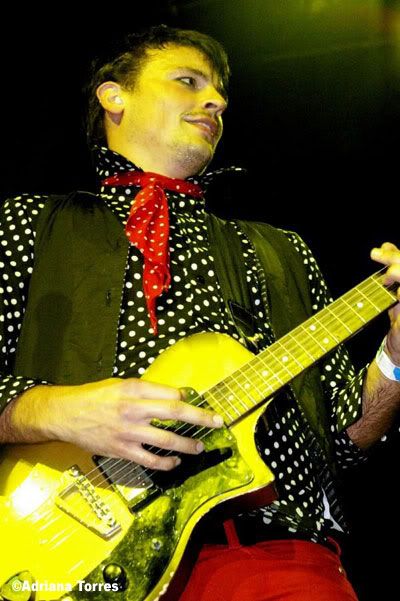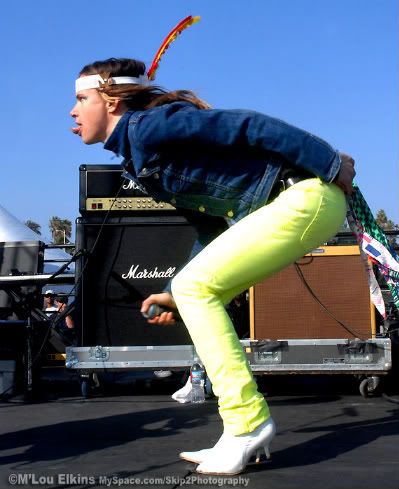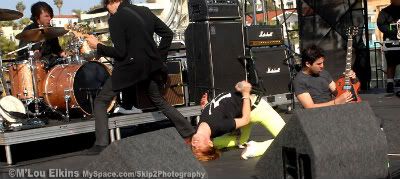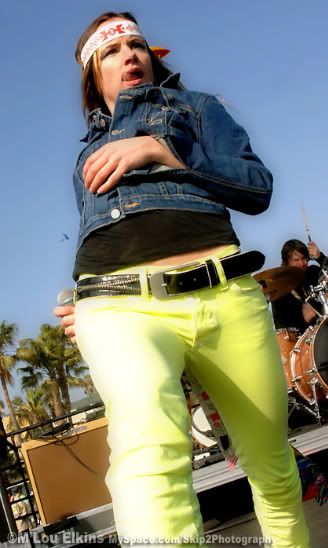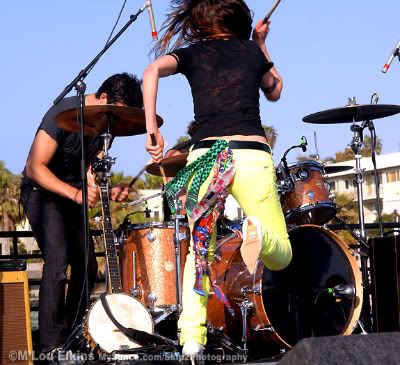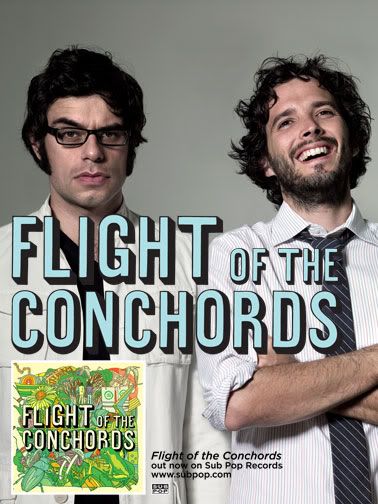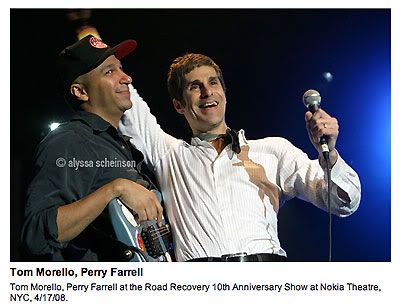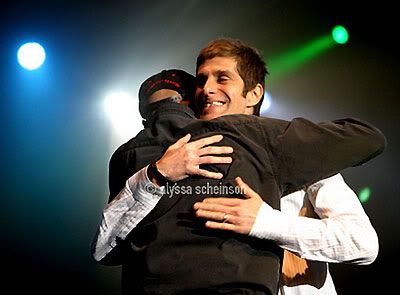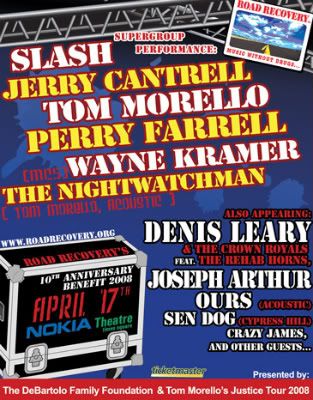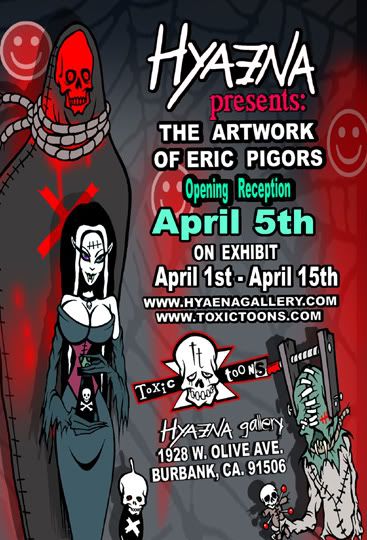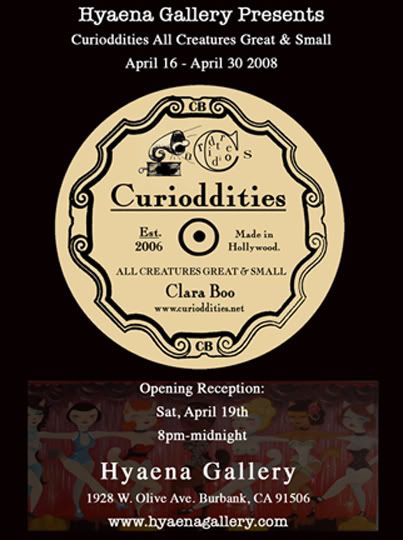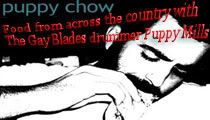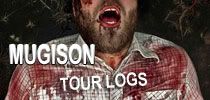
by Taylor Kingsbury
It's 6 p.m. on a Saturday night and I'm in my best friend Andy's truck. Normally the company, the cigarette in my hand, and the awesome force of Tiamat's Clouds that blares from the stereo would be a combination resulting in utter peace. However, on this particular night, I'm not in the best of moods, because I'm not supposed to be listening to Tiamat in Andy's truck as we sit completely stopped in what, at the moment, seems to be the most epic traffic jam the 101 Freeway has ever assembled.
At this particular 6 p.m., I am supposed to be backstage at the Key Club interviewing GWAR. Since I am not doing so at the moment, and it is, indeed, 6:00 p.m., frustration is gathering on my face. Not even Clouds can soothe it, even though Clouds is, indeed, a fucking magnificent record.
I call their tour manager, and it's really just an act of courtesy, because I already know that I'm still at least 20 minutes away, and 20 minutes is an eternity for a band to wait for a lagging interviewer, especially when they are preparing to play another sold out date on their 20th anniversary tour. This interview is not going to happen tonight, that much has already set in.
The call reassures me; he's cool and understanding, and we arrange to speak the following day to set up a phoner. Things start looking better. I can still look forward to interviewing GWAR, the cool-as-hell editor I don't want to let down won't be disappointed, and, even more kickass, I'm still on my way to see GWAR completely destroy the Key Club. Yes, things are looking up.
By 6:20 we're on Sunset Blvd, immediately ensconced in the wonderful, horrible beast that is Hollywood. By 6:30, we're at the Key Club, or more specifically, navigating the quarter mile that surrounds it looking for a place to park.
We find a lot across the street that only costs $7 to park, and for a moment I have to consider the absurdity of the fact that somehow I consider 7 bucks a reasonable price to rent a concrete rectangle of empty space for a few hours.
When we approach the venue, it's 6:40, and the Key Club is a ghost town. There's not a single person outside the venue, save for the one black-clad security guy that stands at the door. In the hundreds of shows I've been to, I've never been the first person there, and I know immediately that something is weird.
But before I can investigate, I have to navigate the will-call window, always a lively part of the entire press experience. The guy at the Key Club's window doesn't disappoint me. We share familiar banter: he asks what my name was again, scans the list again, tells me I'm not on it, I tell him to check under the magazine name, he doesn't see that either, I tell him I'm supposed to have two tickets and a photo pass.
But, he continues to tell me I'm not on the list. And then, I'm not sure how or why, he reaches into a drawer and pulls out a photo sticker, writes GWAR on it, and hands it to me along with two red Admit Ones. I'm happy to have my tickets after the annoying exchange, but I'm left wondering, if that dude just gave me tickets and a photo pass just because I told him I was supposed to have them, even though I wasn't on the list, how many other shows would that work at?
When we try to give the doorman our tickets, we solve the riddle of why no one is standing outside. He tells us that doors don't open until 10:30, and GWAR doesn't go on until 1 a.m., which means that we're still about 4 hours from even being able to go inside and have a drink, and 6 hours away from seeing the band. This sucks.
Silently, I'm pissed off that I rushed to get off work and race out to Hollywood in the heart of early evening traffic to attend an interview that said traffic prevented me from making, but verbally, I express the opinion that I don't want to stand out in front of the Key Club for 4 fucking hours. What to do?
We walk across the street to a liquor store to get some smokes. The counter has a clear plastic protective top, and beneath the plastic are several dollar bills signed by various celebrities. There are four signed by Paris Hilton, who apparently frequents the establishment regularly.
"She comes in quite a bit then?" I ask the two guys behind the counter.
"She comes in a lot for Binaca," one of them tells me.
As we leave, I wonder if he's joking, but I decide it's a lot funnier if he isn't.
Once back at the truck, we consider our options. No matter what we choose to do, we know we have to accept the fact that we ultimately paid 7 bucks to leave Andy's truck in a parking lot for 20 minutes, since the Key Club is located precisely at the spot on Sunset Blvd. where everything else isn't.
That accepted, we head to Amoeba Records. It is a fruitful visit, and I leave with the vinyl soundtrack for John Carpenter's The Thing, a so-awful-it's-fantastic early 80's Sci-Fi movie called Laserblast, and a Napalm Death bootleg from Bolivia.
That's the good news. The bad news is that it's still only 8:30, and we've now visited the only place in Los Angeles that I genuinely enjoy going to.
We then drive aimlessly for what seems like an eternity. We will ultimately cruise down the entire Sunset Strip a total of five times, and we also enjoy a thorough exploration of Beverly Hills and the luxurious neighborhoods that surround it. Along the way, we note the prominent signs on Sunset that implore for "No Cruising", and the civil disobedience feels good.
By this point, we've pretty much said fuck the opening bands, because we're too amped up for GWAR to sit through anything resembling not-GWAR. And, after spending most of the evening waiting for the club to open its doors, the last thing we want to do is arrive with the crowd so that we can stand in line for an hour before getting in. We finally arrive back at the Key Club around midnight, and another 7 dollars secures us another narrow parking space that looks exactly like the one we sat in five-and-a-half hours earlier.
We are only an hour from GWAR now, and the frustrations of the early evening have all but dissipated. We anxiously await $6 beers and onstage defilement as we cross the street from the massive parking garage to the venue. But, as we approach, we see something dreadful that we neither expect nor want: a line.
There are about forty people in front of us when we reach the rear, and, we do our best to be patient for about 20 minutes. But, when that time elapses, and the line has not moved a person, we decide that this sucks. For a moment, we think we're in the wrong spot, since we already have tickets. We ask the people in front of us if they're waiting to buy tickets, but as they answer, we realize how stupid we sound, because nearly everyone in line with us is holding a ticket in their hand.
Something is wrong.
I walk to the front of the line to see what's holding things up, and I see that the reason no one in our line is going inside is because the doors are closed, and the velvet ropes that places like the Key Club put out in front to pretend their establishments are classy are snapped to their posts, blocking line from entrance.
I address the doorman and ask him if I was mistaken about the doors opening at 10:30. He explains that the show has been oversold, and they can't let anyone else in until people start to leave. I am more than confused, because I do, in fact, have a ticket to see GWAR tonight, but if what this doorman is telling me is true, then the Key Club has an unusual take on the ticket/admittance relationship.
I want to scream at him and tell him that when someone has a ticket to see a band play, they should be able to see that band play, and that the very notion of 50 people suddenly calling it a night right before the headlining band hits the stage, thus allowing room for those of us stranded outside to come in, is fucking unlikely. But, I know, ultimately, he doesn't care that I was assigned a review of the GWAR concert on this particular evening, and that I am expected to do that as well as deliver the photographs implied by my assignment of a photo pass, and that I cannot perform any part of this equation without actually getting inside to see the show.
We mill around outside the Key Club for another 20 minutes, and nothing changes. There is no last minute deflux of people who decide that they really didn't want to see GWAR, after all. As the band takes the stage inside, we remain standing on the street, deflated and disappointed. Eventually, we crush our pathetic looking Admit One tickets, because, after all, those fucking tickets didn't admit either one of us to shit.
I curse the Key Club the entire way home, and for many days afterward to anyone who asks me how the GWAR show was. Time has not granted me the wisdom to understand why the Key Club management has their heads too far up their asses to count how many people fit into their place, and stop selling tickets when they reach that number. I will see GWAR next time they come to town, but I will never buy tickets for any show at the Key Club, since I now know that having a ticket doesn't really mean that you're going to see a show there.
Two days later, I finally get my interview, after being forced to make the daunting decision levied at me by GWAR's tour manager: Do I want to talk to Flattus Maximus or Beefcake The Mighty?
I choose, and Beefcake takes the phone, greeting me with exactly the gruff hello one would expect to come out of a road-weary Scumdoggian war-lord.
"God, my throat is fucking killing me. I think I caught something in Los Angeles," the bassist/vocalist explains.
This doesn't stop him from generously reflecting on the significance of the 20th Anniversary Tour his band is currently embarking on. In today's musical climate, it's hard for any band to last that long, especially when said band is comprised of crack-smoking monsters from outer space. But, GWAR aren't just persevering, they're still on the rise.
Their last record, War Party, was a churning thrash metal feast that many fans and critics called the band's best since the one-two punch of Scumdogs Of The Universe and America Must Be Destroyed, the 1990 and 1992 releases that garnered the band the best exposure of their career and fully demonstrated the might of their musical powers. Since the Party, a funny thing has been happening to GWAR: they're selling out shows all over the world.
"Since the last record, the War Party album, and then the Sounds of the Underground Tour, there's been a resurgence of GWAR," Beefcake explains. "When we were on this Summer tour, the booking agents and the so-called powers that be, the ones that we let walk around and think they're making big decisions for us, they're like, 'maybe in the Fall, because GWAR's huge for Halloween we'll do like maybe three weeks around Halloween in the East and the Midwest.' And then the calls started coming in, and people were like, 'we fucking want GWAR, GWAR, GWAR, GWAR.' Pretty soon we're going to do a month. Oh, we're going to do five weeks. Maybe we're going to do six weeks. Seven weeks. Now it will be fucking, like nine and a half weeks by the time this fucker's done and we're selling out rooms and just fucking slaying. It's been great. It's a fucking killer tour.Ó
After 20 years in the game, Beefcake says that GWAR have achieved the "infamous notoriety" they sought when they first donned their armor in 1985. But, one thing has eluded them in their quest for world domination.
"Money," Beefcake demands. "We've yet to make a fucking dollar. We need money. And Japan."
Japan?
"We haven't been to Japan. All the fucking years, and chrissakes, we're monsters, and we haven't been to Japan. Can you understand that? It's a logistical nightmare to send GWAR anywhere. To go on a U.S./Canada sweep, let alone put our stuff in a plane, or a giant bat-shaped helicopter, and send it over to Japan."
It's really a shame, because it's a safe bet that Japanese audiences would appreciate the band's legendary performances. I won't insult you by divulging the details, because you wouldn't have read on this far if you didn't know exactly what goes on at a GWAR concert. Beefcake says that the performance aspect of GWAR has always been a key component of the band's existence.
"The stage show has always been over the top, and that's never been a question. It's always been entertaining. Without trying to sound like a big-headed egomaniac, it's one of the greatest shows in fucking rock."
This time out, the band's set features a well-rounded cast of celebrity guest-stars, including Sharon Osbourne, Dick Cheney, and, as one might suspect on the "War Party" tour, the "War President" himself, who meets a particularly gruesome onstage demise. Beefcake assures me that this is merely business.
"Seems like no matter how many Presidents we kill, they just keep growing new ones," Beefcake laments. "We've been killing all the Presidents since Grover Cleveland. You wouldn't know it though. Only in public since Reagan."
After their hectic touring schedule lightens, GWAR plans to reconvene to shape the record that will kick off the band's third decade.
"We've got two more weeks, then we'll retreat back to the Antarctican stronghold. We'll write and record for a couple months, then we're going to work on another battle plan."
Beefcake says that fans should expect the band to continue to build on the onslaught demonstrated on War Party, further distancing themselves from the stylistic stretching they noodled with through the turn of the century. In recent years, GWAR have been more comfortable sharing the stage with some of today's most prominent death metal acts, which may partially explain the abundance of heaviness in the band's latest output. But, Beefcake reminds me that GWAR burst from the underground long before Sounds Of The Underground even existed.
"We're just being reinspired by our own roots," Beef explains. "I'm not taking anything away from the bands we've been playing with, because I fucking love a lot of the bands that we have been playing with. We're all from the old thrash metal and punk school, you know? It's been there the whole time, we just had to fuck up with that ridiculous 'Fish Fuck' and such. The metal's always been there, we were just trying things. We were fucking whacked out on the junk, man. War Party has assured the fans that it is metal, and the one we come out with next Summer is going to solidify and hopefully put us back in the same kind of category as Scumdogs did, if not bigger, because it seems like metal has a new acceptance globally."
When I ask Beefcake about the band's songwriting process, his explanation is typically off-kilter.
"Parts is parts, I've heard said. We've all got different little ditties that go through our heads as we sleep in our little coffins, flying down the highway. Being in that bunk is much like being in a drawer for me with my immensity. Sometimes I take the helmet off when I go to bed, sometimes not. At least we don't get up to go to the bathroom, we just lay there and piss ourselves. That's the beauty of being GWAR... Now, the question was what?"
I remind him, and he elaborates.
"We go into the studio, and it will be myself, Flattus [Maximus, guitars], Balzac [the Jaws Of Death, guitars], and Jizmak [da Gusha, drums], and we'll throw ideas around, toss things around, break things, yell at each other for a while. We'll have ideas, and we'll play for a while. If it catches someone's attention, that's good. And then the next day, we'll come in, and see what we did, and then change everything."
Ironically, amidst their outrageous antics and otherworldly personas, GWAR's music is the one component that seems to get the least attention from the music public. Even cursory inspection of the band's wide catalog reveals that, yes, in fact, the dudes can fucking play. With the sophisticated arrangements and volatile riffing on War Party, Beefcake says that people are finally paying attention to the tunes, as well as the mythos.
"I think we're finally getting some merit as musicians. Other bands are stepping up, and we're getting accolades from the metal community. We're getting some real respect on the musical side, which is good, cause I think we deserve it."
After 20 years, GWAR remain as lively and creative as ever, and their continued presence on the scene is a welcome kick in the nuts for people who can't take a joke worldwide. Perhaps before their next 20-year anniversary, the band will be able to make it to Japan to kick some nuts out there.
And maybe, just maybe, next time they come to Southern California, my ticket will actually get me in to see them.
